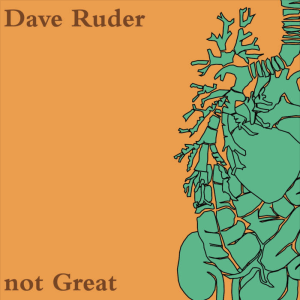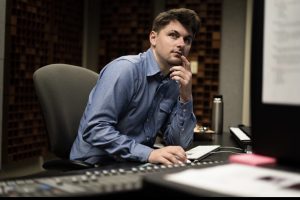By Austin Franklin, Special to the Sybaritic Singer
The fifth full length studio album from Gold Bolus Recordings founder Dave Ruder, entitled “not Great”, is an unapologetic collection of songs that sits somewhere between popular and experimental genres, incorporating aspects from art song, popular music, indie, folk, and techno. The album is both a hilarious and heartwarming display of 21st Century humanity that explores lobsters with bodily odor and potato parties, as well as the grief of loss and the recognition of pain. The album’s title refers to these feelings along with feelings of spending many post-COVID months in isolation and invites the listener to answer the all-important question, “How are you?”.

The theme of the fallibility of human bodies and striving to not be in pain is central to the album musically and lyrically after a pre-existing hand and wrist injury was exacerbated due to COVID. Although this injury prevented Ruder from recording guitar on one of the tracks, it did not prevent him from writing, arranging, and producing the album as well as performing a multitude of other instruments not limited to vocals, piano, synthesizer, and the clarinet. The album also invites several guest performers such as Isabel Castellvi on cello, Andie Tanning and Karen Waltuch on violin and viola, Jonah Rosenberg on guitar, Jonathan Zorn and Sam Morrison on synth bass and Rhodes synth, and Kyra Sims on horn in F. All the performers recorded themselves at home and the album was mixed and given a sonic coherence by Stephe Cooper.
A rich and colorful counterpoint contrasts moments of incredible sparsity and silence
The album maintains a consistent sound world throughout that is usually provided by a smooth interweaving texture of strings, among other instruments. In “To Stay Alive” the ensemble performs and maintains an almost improvisatory and conversational dialogue with the vocal melody. The textures in this track offer a rich and colorful counterpoint that is contrasted with moments of incredible sparsity and silence. Throughout most of “not Great” a single violin plays pizzicato in unison with the vocal line. This wide range of textures allows Ruder to explore and aid the emotional extremes of the moods present within each track.
Ruder’s vocals continuously blur the lines between sung passages, sprechgesang, and sprechstimme. He makes use of this interplay between speech and singing to create lines that are both dream-like and entrancing. Rhythmically the vocals aid this effect with rather long and calm pauses in between entrances. These entrances contain just a few words each, as in the case of “Pious Rious”, as though Ruder is unhurried, dillydallying, and awaiting the moment at which isolation ends.
not Great evokes imagery that exists somewhere between the sensible and absurd, the earnest and silly, and the real and imaginary
Lyrically this trance-like quality is exacerbated by drawing upon themes and evoking imagery that exists somewhere between the sensible and absurd, the earnest and silly, and the real and imaginary. The first track on the album, “Biggest Lobsters”, is about living with change and being present in your surroundings. Rather than traveling to nearby barrier islands and erecting permanent structures for the future, you should exist in the moment and allow the tide to “reset” or erase those structures. The theme is comically offset by the narrator wondering if the lobsters will notice his own bodily odor knowing all too well that lobsters also have a particularly unpleasant scent.
A consistent theme throughout the album revolves around the difficulty of being a person and having a body. Alongside mentions of being self-conscious of one’s own body odor is being uncomfortable at the DMV, having to plan things, the compulsion to be productive, and feeling “shitty in general”. This theme also carefully walks the line between being serious and light-hearted in “not Great” where Ruder describes feeling mentally and physically exhausted and struggles with “cutting himself… a little slack”. Moments like this throughout the album are an incredibly vulnerable and chilling display of internal struggle and further showcase Ruder’s lyrical artistry.
Ruder’s sensitivity to form is highlighted by the large variety of musical structures present in the album
The tracks on the album exhibit a wide variety of forms, with some having a simple verse-chorus structure such as “To Stay Alive”. Others are structured more like sectional art songs such as the seventh track on the album, “Love Song in the Linens”. Tracks like “Cosplay” and “Pious Rious” have asymmetrical structures and shifting chords that vary from section to section. The variety of structures that exist throughout the album provide a refreshing change of pace and highlight Ruder’s sensitivity to form as well as his carefulness and attention to the more macro elements of songwriting such as pacing, flow, and long-term harmonic goals.
This album is hilarious, sad, scary, and bizarre all at once. It is also exactly what the world needs at a time like this. We can all relate to its emotional honesty and reflect on our own time spent in isolation. What outrageous thoughts, musings, or imaginative ramblings did we have during this time? How did this time affect us both mentally and physically? How am I at the current moment and have I begun to allow myself to heal? Ruder invites listeners to consider these questions by balancing multiple themes and emotions simultaneously in both a compelling and engaging manner, and I invite all of you to make “not Great” a part of your collection.

Austin Franklin is an internationally recognized composer and sound artist based in Baton Rouge, LA where he is currently pursuing a PhD in Experimental Music & Digital Media from Louisiana State University. His interests include music involving process, such as algorithmic composition and music incorporating machine learning technologies. His latest album, Four Idols, has been described as “an elegant, artistic statement that demonstrates the flexible possibilities of electronic music” (The Sybaritic Singer). Austin has several pieces for percussion published through C-Alan Publications and his music has been performed throughout North America, South America, Europe, and Asia. He is the recipient of several awards and commissions, including the RMN Call for Electroacoustic Works 2021, the Hypercube Composition Lab, SCI Region IV Mixtape, PARMA Winter Call for Scores. His music has also been selected for festivals and conferences such as NEMF 2022, Festival Ecos Urbanos, the New Music on the Bayou Festival, Splice Institute, NYCEMF Festival, WOCMAT, Alba Music Festival, Society of Composers Incorporated, and Electric LaTex. Austin has presented research at the Web Audio Conference (2021) that explores using Web API’s as the basis for designing digital instruments, and at the New Interfaces for Musical Expression (2019) Conference that involves simultaneous auditory and vibrotactile stimuli. For more visit austinfranklinmusic.com.
